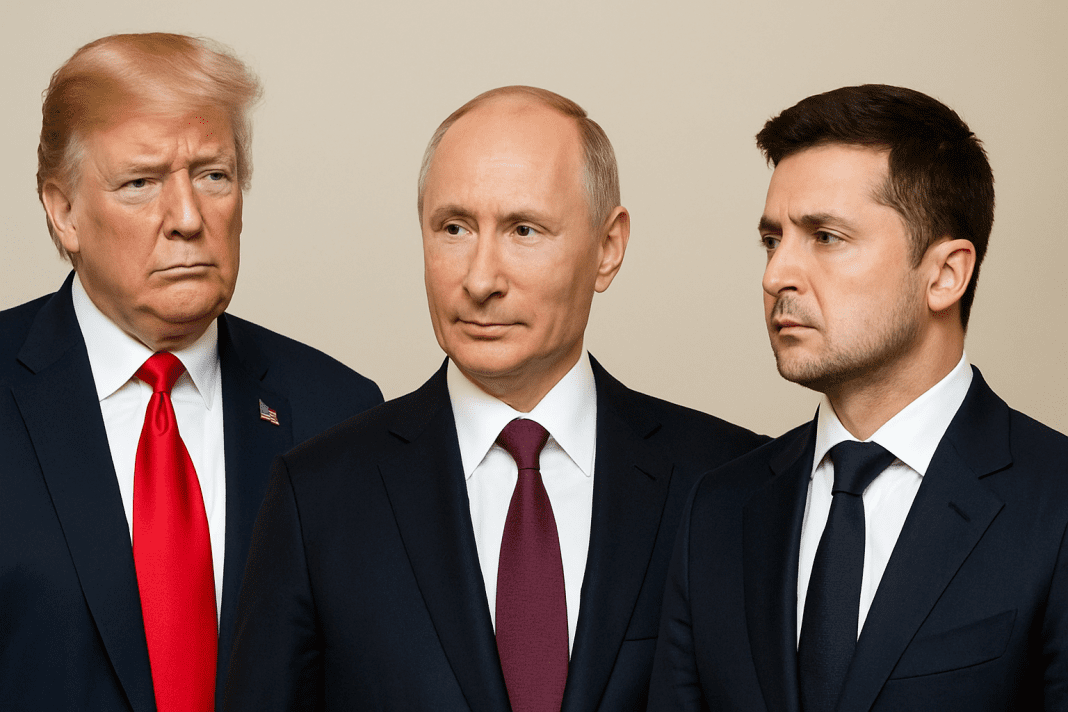In a major geopolitical twist, U.S. President Donald Trump has announced plans for a three-way summit with Russian President Vladimir Putin and Ukrainian President Volodymyr Zelensky — but with no involvement from NATO or the European Union.
Surprise Call from Trump Reveals Exclusive Summit Plans
The bold plan came to light during a private phone call between President Trump and several top European leaders. Sources close to the discussion revealed that Trump shared details of a possible in-person meeting involving just three leaders — himself, Putin, and Zelensky — possibly within days.
What has shocked many across Europe is the exclusion of NATO and EU officials from the meeting. Trump reportedly emphasized that only the U.S., Russia, and Ukraine would participate — leaving out long-standing transatlantic partners and alliances that have traditionally played central roles in conflict negotiations.
This would mark the first U.S.-Russia presidential summit in over four years and the first-ever exclusive gathering of these three nations. The news has caused a wave of uncertainty and concern among U.S. allies, many of whom feel sidelined by this unexpected move.
🔥Russia shreds Cold War missile pact that once stopped WWIII after Trump deploys submarines
The decision to go forward without NATO or EU representatives has raised serious diplomatic questions and left many wondering about the summit’s objective, format, and the nature of discussions to take place.
European Capitals Rattled by Trump Announcement
European leaders were reportedly caught off guard when Trump revealed the plan during what was described as a routine consultation call. According to officials familiar with the call, the tone quickly shifted once Trump introduced the summit plan without NATO or EU involvement.
One senior European diplomat described the mood after the call as “shocked, uneasy, and unprepared.” Officials in France, Germany, Poland, and the United Kingdom are now seeking clarity and reassurance on the role of Europe in any talks involving the war in Ukraine.
Some diplomats are also asking whether U.S. national security agencies have coordinated the summit, or whether President Trump initiated it directly. So far, officials have not released any documents, agendas, or briefings to the public.
Trump warns Russia of new sanctions on shadow fleet if ceasefire is not reached
European media outlets have also reacted strongly to the news. Major newspapers and broadcasters across the continent are publishing headlines about the summit. Analysts are actively debating how this exclusive format could impact Western unity, especially at a time when transatlantic cooperation plays a crucial role.
One unnamed EU official said, “We did not receive any information, any invitation, and we do not know the purpose.” This is not how high-level diplomacy usually works.”
The lack of transparency around the planning has only added to the concerns. Many are wondering what Trump’s intended outcome might be, especially considering the ongoing military tensions between Russia and Ukraine, and the strong positions previously taken by NATO.
No NATO or EU Comment as Questions Multiply
So far, there has been no official comment from either NATO headquarters in Brussels or from the European Union’s foreign affairs office. Officials in both organizations are holding internal discussions, assessing the situation, and awaiting formal communication from Washington.
Observers say that the absence of NATO and EU representation at such a critical summit is highly unusual. Past U.S.-Russia talks — especially during active conflicts — have generally included allied nations and multilateral diplomacy efforts. This summit, however, breaks away from that tradition entirely.
There has also been no word on the location or time of the meeting. U.S. and international media outlets are attempting to gather details, but officials from all three countries have remained tight-lipped.
Another source of concern is the security and diplomatic protocol surrounding the summit. High-level summits usually require months of preparation, including briefings, strategy sessions, and coordinated messaging. None of those steps appear to have been taken publicly.
Trump admits Ukraine needs defenses — but calls Patriots ‘very rare, very expensive’
President Trump’s decision also brings back memories of his earlier criticisms of NATO. Throughout his political career, Trump has repeatedly stated that NATO countries must “pay their fair share” and has called the alliance “obsolete” in certain contexts. This recent move may be seen by some as a continuation of his earlier views on reducing America’s dependency on alliances.
The announcement has triggered a flood of reactions on social media and in diplomatic circles. With no official clarification yet from NATO, the EU, or the current U.S. administration beyond Trump’s direct disclosure, the world is now watching closely for the next developments.

